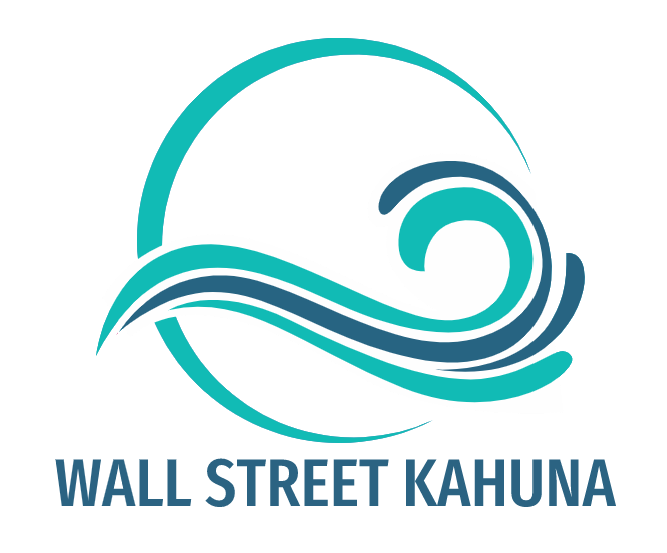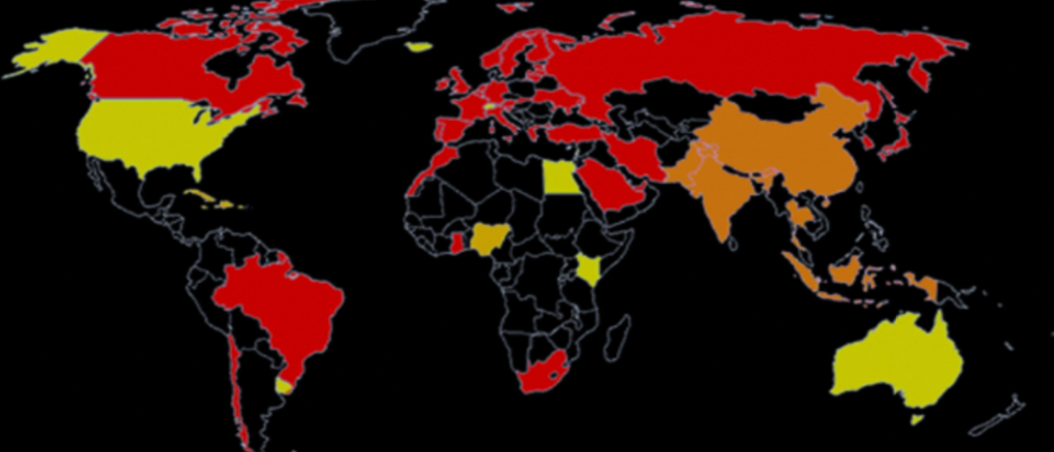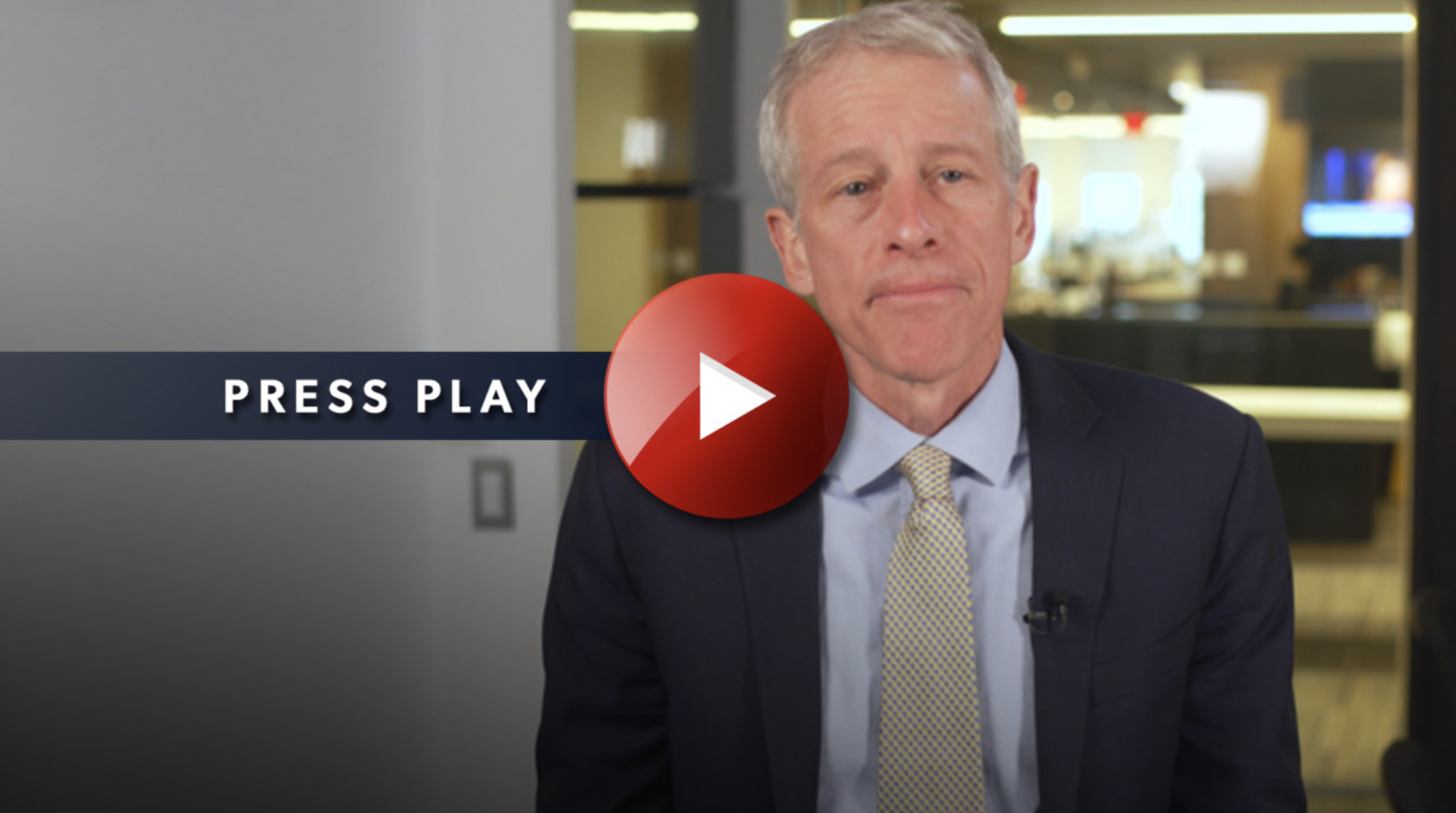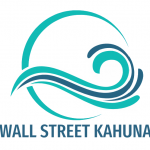These rock-solid companies can help investors navigate a market rife with recession risk.
There are no two ways about it: This has been a trying year for both new and tenured investors. Since hitting their respective all-time closing highs, the 126-year-old Dow Jones Industrial Average, benchmark S&P 500, and growth-focused Nasdaq Composite have respectively fallen by as much as 19%, 24%, and 34%. This means the Nasdaq and S&P 500 are officially in the grip of a bear market.
To make matters worse, there’s the growing likelihood that the U.S. could enter a recession. First-quarter gross domestic product (GDP) in the U.S. shrank by a surprising 1.5%, and the latest forecast from the Federal Reserve Bank of Atlanta calls for 0% GDP growth in the second quarter. With the Fed entering a period of aggressive monetary tightening amid historically high inflation, there’s the real possibility the stock market could head lower.
But there are two sides to this coin.
Periods of expansion last disproportionately longer than contractions. Further, every bear market throughout history has eventually been cleared away by a bull market rally. In other words, big drops in the broader market are the perfect opportunity to do some shopping.
The good news is there are a number of especially safe stocks to buy that can help patient investors navigate a market rife with recession risk. What follows are four of the safest stocks to buy if the U.S. dips into a recession.
AT&T
The first exceptionally safe stock investors can buy is telecom behemoth AT&T (T 2.21%). Take note that AT&T is parsing out a 5.7% annual yield, which’ll take a big bite out of historically high inflation.
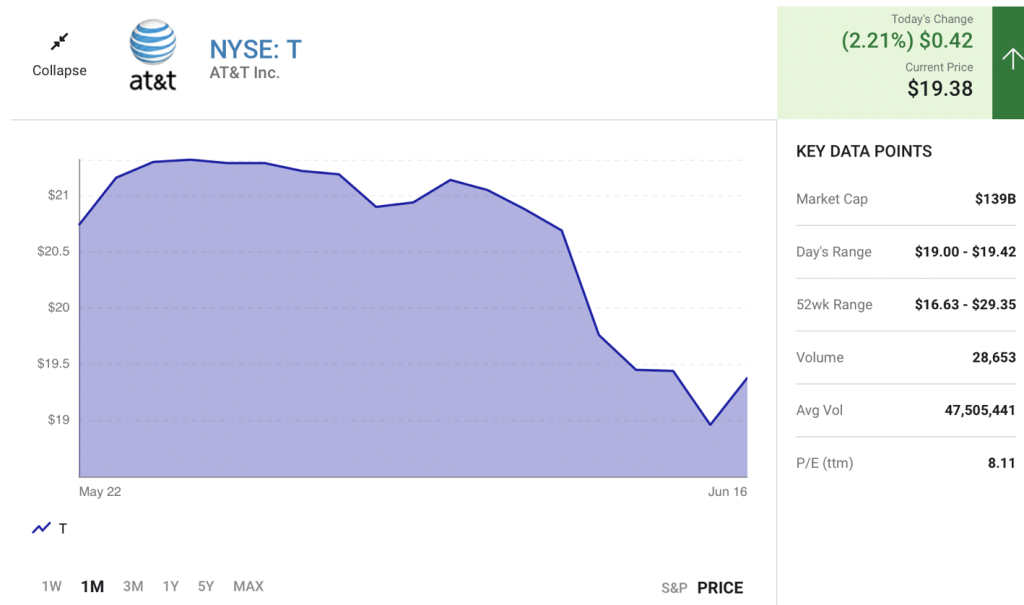
The beauty of telecom stocks is that their operating cash flow tends to be transparent. Over the past two decades, owning a wireless device/smartphone and having access to wireless services have effectively become basic necessities. This suggests that economic downturns are unlikely to result in a significant increase in wireless churn rates.
AT&T is also working on its biggest organic growth catalyst in about a decade — the 5G revolution. The company is spending billions of dollars to upgrade its wireless infrastructure to handle 5G download speeds. The expectation is that we’ll witness a multiyear device-replacement cycle that leads to a sizable increase in data consumption, and data happens to be where AT&T’s juiciest wireless margin come from.
Additionally, AT&T spun off content arm WarnerMedia in April, which was subsequently merged with Discovery to create an entirely new media entity: Warner Bros. Discovery. When this merger was finalized, AT&T netted a $40.4 billion cash payment that it can use to reduce its outstanding debt and improve its financial flexibility.
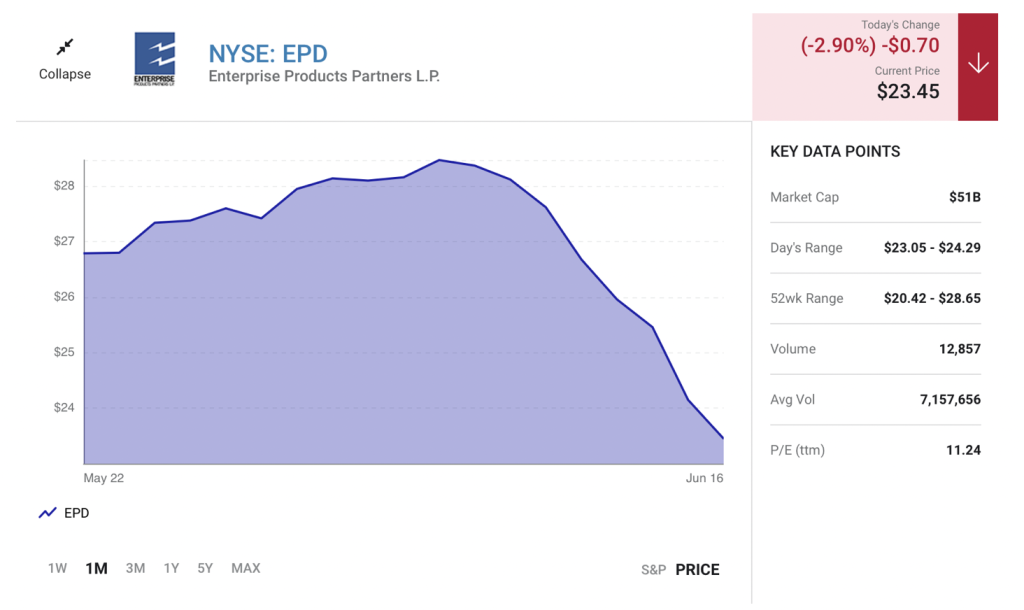
Energy Products Partners
Another rock-solid stock investors can confidently buy if the U.S. were to enter a recession is oil and gas midstream operator Enterprise Products Partners (EPD -2.90%). The company’s 7.9% yield almost entirely offsets the highest inflation reading we’ve seen in four decades.
Although the idea of putting money to work in energy stocks might not sound palatable, with the memory of what happened in 2020 still fresh in many investors’ minds, Enterprise Products Partners isn’t a driller. It operates transmission pipeline, storage facilities, and refining capacity within the energy complex. Energy middlemen like this typically rely on fixed-fee or volume-based contracts, which means they have little or no exposure to wildly vacillating crude and natural gas spot prices.
Something else to consider about Enterprise Products Partners is that, even during the height of the March 2020 pandemic, which yielded a historic drawdown in crude oil demand, the company’s distribution coverage ratio (DCR) didn’t fall below 1.6.
The DCR measures the amount of distributable cash flow from operations relative to what was paid to shareholders. Since this figure never came close to falling below 1, this company’s base annual payout, which has grown for 23 consecutive years, was never in jeopardy.
AutoZone
A third extremely safe stock investors can add to their portfolios if a U.S. recession takes shape is leading auto-parts retailer AutoZone (AZO -0.43%). Unlike the other companies on this list, AutoZone doesn’t pay a dividend. But that hasn’t seemed to matter, with shares of the company higher by more than 27,000% since the early 1990s.
What makes AutoZone so attractive is a confluence of auto-industry trends. For example, Americans are buying new vehicles less frequently. To build on this point, newer vehicles are also designed to last longer. According to the Bureau of Transportation, the average vehicle on the road is more than 11 years old. The implication is that drivers intend to hang onto their vehicles for longer periods, which plays right into AutoZone’s core operating model.
The company’s success is also a reflection of its distribution network. Instead of relying on vast inventory warehouses for parts replenishment, AutoZone leans on its mega hubs, which are AutoZone stores that carry up to 110,000 different products. These “hubs” act as replenishment channels for smaller nearby locations, and has helped AutoZone avoid the inventory gluts that have affected other retailers.
If you need one more good reason to trust AutoZone, consider this: The company has collectively repurchased almost $29.1 billion of its common stock since fiscal 1998.
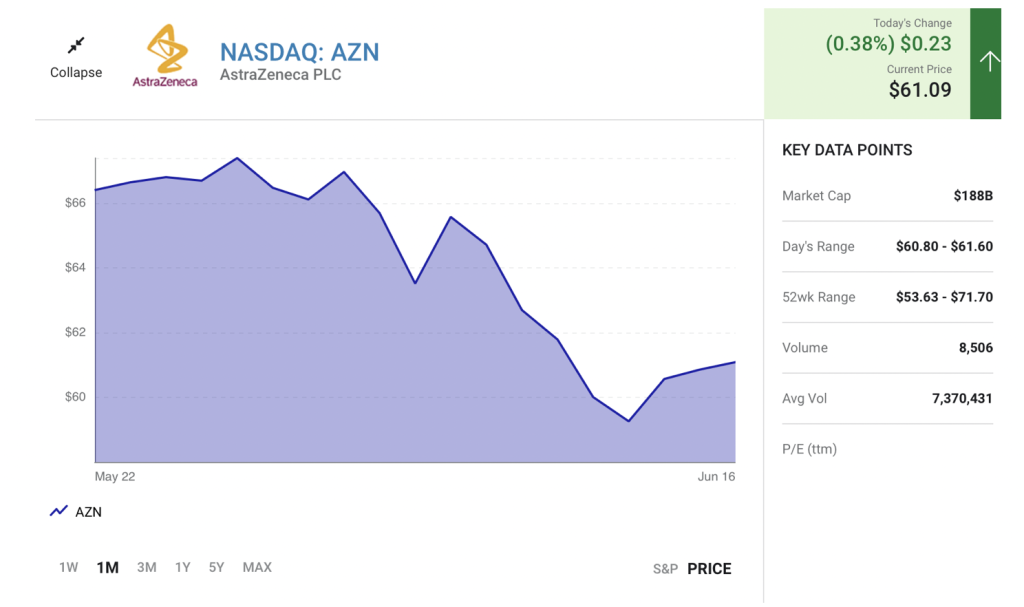
AstraZeneca
A fourth safe stock to buy if the U.S. dips into a recession is pharmaceutical company AstraZeneca(AZN 0.38%). The company is currently doling out a respectable 2.4% yield.
The great thing about healthcare stocks is that they’re defensive. No matter how volatile the stock market gets, or how well or poorly the U.S. economy performs, people still get sick and require prescription medicine, medical devices, and healthcare services. This provides a base level of demand for drugmakers like AstraZeneca.
Innovation is what powers a company like AstraZeneca — and it’s getting that innovation on two fronts.
To begin with, it’s seeing consistent double-digit growth from its trio of blockbusters in its oncology segment (Tagrisso, Imfinzi, and Lynparza), as well as high double-digit sales increases from next-gen type-2 diabetes drug Farxiga. Oncology and cardiovascular therapeutics can easily propel AstraZeneca to strong sales and profit growth throughout the decade.
The other component is its acquisition of rare-disease drugmaker Alexion Pharmaceuticals, which closed last year. Rare-disease drug developers often face minimal competition and typically encounter no list-price pushback by insurance companies. If they can get a drug approved by the Food and Drug Administration, rare-disease drugmakers usually become cash cows.
Read Next: America is going mad—is this next?
America is definitely going a little mad…
Some states are threatening to break away. The rich are fleeing. The wealth gap is soaring.
According to a recent article in the New York Times, people are driving more recklessly than ever… and drinking more alcohol than ever too.
And that’s just the beginning…
Altercations on airplanes are now at all-time highs. So are murder rates. And violent crime is soaring across the board. Students are more disruptive than ever. Hate crimes have hit a 12-year high, according to the FBI.
The question of course is:
Where is this all headed… and what’s coming next?
Well, one of the wealthiest and most successful entrepreneurs in America has a very clear answer you’re unlikely to hear anywhere else…
Bill Bonner is a 73-year-old son of a tobacco farmer, who now owns six large properties in South America, Central America, and the U.S… plus three in Europe.
Bonner is also one of the most humble and thoughtful men in the world today. He’s the author of three New York Times bestsellers… and has built several homes with his own hands, using ancient building techniques.
I’m telling you about Bonner today because has just come forward with an important message…
What he calls: His 4th and Final Warning.
It’s worth paying attention to, because Bonner has made 3 other big macro-economic predictions in his career… and each one proved to be exactly right.
Today, Bonner says we are headed towards a very difficult period in the U.S.… one of our most difficult times ever… which will result in something he calls: “America’s Nightmare Winter.”
What does that mean, exactly—and how could it affect you and your money?
Bonner doesn’t claim to have all the answers–but he recently went public with the fascinating analysis, recorded at his 60-acre property overlooking one of Europe’s most beautiful rivers.
He says:
“I believe it falls on someone like me to warn people… clearly… and without distraction.
“I can do this now because I’m too rich to care about money… and too old to care about what anyone says about me.”
And in this analysis, Bonner explains exactly how he believes this difficult period will play out, and even more important: The 4 Steps every American should take right now to prepare.
Get the facts.
Learn how to protect yourself and get a peek inside Bonner’s spectacular European property.
We’ve posted Bonner’s full analysis and his 4 recommended steps on our website.
You can view it free of charge here…
